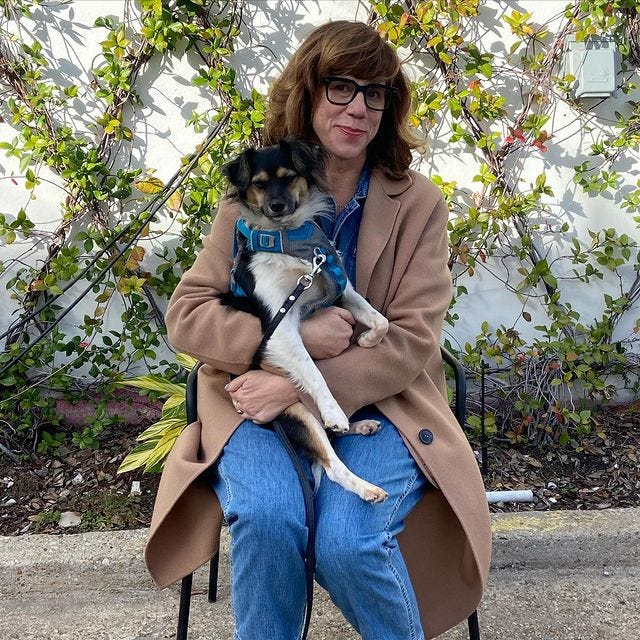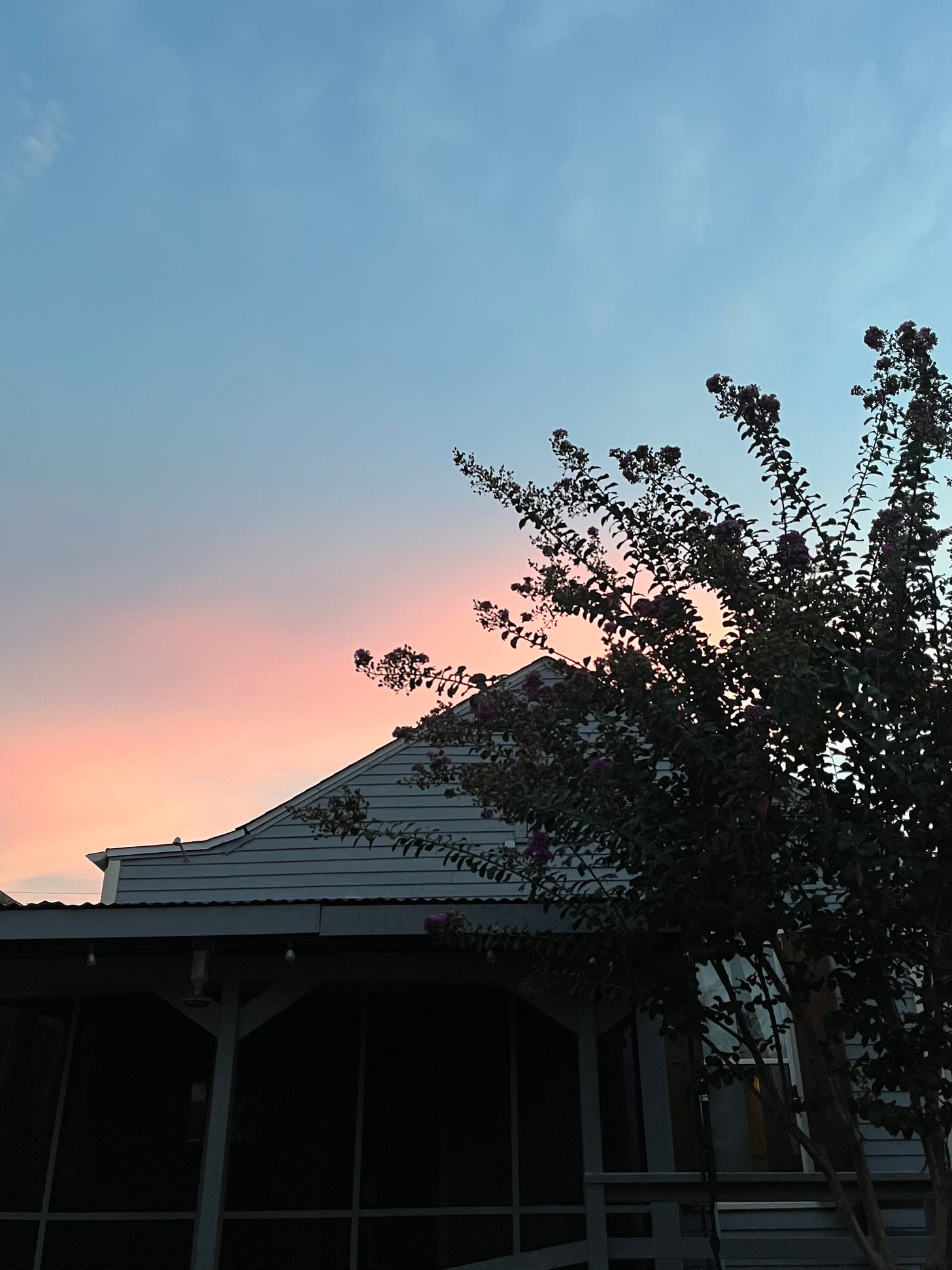Writing Food in Fiction with Jami Attenberg
"I am just a humble servant to the fantasy of eating"
Today I have a short but sweet conversation about writing food from a fictional perspective with the novelist Jami Attenberg, a fellow New Orleanian, who used to bring her very cute dog to my somewhat infrequent cake slice pop-ups. I normally aim for two newsletters a month - I recognize this one is coming a little more rapidly on the heels of the last than usual, but I’ll space these out more in the future.
But first:
I recently discovered this website, featuring an annotated English translation of the earliest surviving cookbook, the Roman text De Re Coquinaria of Apicius from the late 4th century CE. Yes, it looks like a homemade Wordpress site from 19971, but I’ve been really enjoying doing keyword searches to find chestnuts like the following, a method for preserving pomegranates: “Steep them into hot sea water, take them out immediately and hang them up. They will keep”. Will they though??
If you’re a data nerd you might enjoy this article by Saul Justin Newman on why the conversation around blue zones / extreme aging is marked by a lack of academic rigor:
“Okinawa in Japan is one of these zones. There was a Japanese government review in 2010, which found that 82% of the people aged over 100 in Japan turned out to be dead. The secret to living to 110 was, don’t register your death.”
Turns extreme aging is less about eating seafood and more about pension fraud!
Recently I began the book This Is How You Lose The Time War by Amar El-Mohtar and Max Gladstone and then promptly lost my copy of it somewhere in my house. I was really drawn in by it and I feel like I can’t start anything new until it turns up. In the meantime I’ve been catching up on zines: Candy Land by the folks at Cake Zine, and On Making a Living As An Artist by the Creative Independent. I’m also really looking forward to the upcoming recipe zine by At Heart Panadería. Long live zines!
Writing Food in Fiction with Jami Attenberg
I recently took Alicia Kennedy’s excellent course on newsletter-crafting, where she mentioned that the writer Jami Attenberg had put out an unusual call: she would be willing to answer three questions from anyone with a newish Substack. I’d recently partnered with my friend Keia to hold a personal writing accountability session around Jami’s book 1000 Words: A Writer’s Guide to Staying Creative, Focused, and Productive All Year Round, so her work was top of mind.
An admission: I’d also recently sat across from Jami at a dinner party, where I’d confessed my secret dream of writing a science fiction romance novel (how many people confess these dreams to writers over fresh corn salad and roasted fish?). I took this opportunity to ask Jami what she thinks about writing food from the perspective of a novelist.
A thought that will stay with me: that writing about food and dining is not just about the meals that we eat, but also how we want to be perceived by others. Though my food writing has always been non-fiction, I’ll continue to mull over how the type of recipes I publish and the way I write about food represent more than just flavors and techniques, but also how I want to be seen. From Jami:
“not just what a character eats (or drinks), but how it makes a character feel, what it says about them, and what they think it says about them.”
Bronwen: I'm thinking of the way you craft interiors and the small details that tell us how a family might be shaped: the father who sits at the head of the dining table in view of the TV in the kitchen, which is always left on, or the mother stirring insipid canned lentil soup that she won't really eat. Do you have a favorite detail related to dining or a meal in one of your novels? Or someone else's novel?
Jami: When I think about food in my body of work, I have to think about my fourth book, The Middlesteins. A lot of that book is about certain characters loving food but also having a complicated relationship with it. There's quite a bit of fast food in it but also a comforting scene involving fresh rye bread. I did try to make most of the food in that book sound delicious, so that we have a deeper understanding--at least in part--of their emotional connection to eating.
In general, I try to write food into my book that I would want to eat. Food scenes are a great device to get to know a character. Sometimes if I don't know what to do with a scene I just have a character start eating something and even if I don't end up using it, I've probably gotten to know the character a little better in the process.
Nora Ephron's Heartburn is a classic in terms of using food, and of course her mashed potato moment/recipe is one of my favorites. Here's a quote:
“In the end, I always want potatoes. Mashed potatoes. Nothing like mashed potatoes when you’re feeling blue. Nothing like getting into bed with a bowl of hot mashed potatoes already loaded with butter, and methodically adding a thin cold slice of butter to every forkful. The problem with mashed potatoes, though, is that they require almost as much hard work as crisp potatoes, and when you’re feeling blue the last thing you feel like is hard work. Of course, you can always get someone to make the mashed potatoes for you, but let’s face it: the reason you’re blue is that there isn’t anyone to make them for you.”
Bronwen: Does writing a good meal make you crave it? Do you write and cook along with your characters?
Jami: Yes! In The Middlesteins I invented a Chinese restaurant in the suburbs of Chicago. When I was growing up there, we never had any good Chinese restaurants--I mean they were all fine, don't get me wrong, I'll eat the hell out of any egg roll, but they were pretty greasy. And I just thought what kind of restaurant I would have wanted there, and then I invented a menu. I was also influenced somewhat by this piece by Calvin Trillin in the New Yorker about this wildly talented, peripatetic Chinese chef who worked in Chinese restaurants up and down the Eastern seaboard.
I do NOT cook though. Not in any sort of formal way. I fantasize about the taste of things and I have gotten recipes from chefs and also reads of my work by chefs to make sure I get the details right. But I am just a humble servant to the fantasy of eating.
In my new novel, A Reason to See You Again, I am occupied with the idea of eating by yourself in restaurants, not just what a character eats (or drinks), but how it makes a character feel, what it says about them, and what they think it says about them. I also have some good comfort food moments in the book. Buttery popcorn, more delicious Chinese food, a big breakfast scene with lots of bacon. These meals accompany sadder, more poignant moments, and in part I wrote them in to make me feel a little bit safer in the moment.
Bronwen: Do you have a favorite writing snack or beverage when you're working?
Jami: I think most people who work from home, whatever their job, live for those snack and meal-time moments. I try to keep a lot of fresh fruit in the house and I do a lot of drive-by grazes of grapes or raisins or blueberries throughout the day. But also I do like red licorice and sometimes keep that on hand. It sort of depends on whether I'm doing a long-haul project like writing a novel, which is less stressful, and more about the ebbs and flows versus a shorter project with a deadline. Then I might need a little processed sugar to get me across the finish line. Also coffee. Two cups of coffee a day is where I have landed in my life. But no more than that or I'm gonna fly to the moon and back.
Thank you, Jami!
Jami Attenberg is the New York Times bestselling author of nine books, including The Middlesteins, All Grown Up and a memoir, I Came All This Way to Meet You: Writing Myself Home. She is also the creator of the annual online group writing accountability project #1000wordsofsummer, which inspired the recently published USA Today bestseller 1000 Words: A Writer’s Guide to Staying Creative, Focused, and Productive All Year Round. Her tenth book, publishing September 24, 2024, is A Reason to See You Again. She lives in New Orleans. You can find her online regularly at Craft Talk.
I later realized it’s quite genuinely from 1997.







Love this so much! Thanks for the shout out🥰
I love the excerpt from Heartburn. I had forgotten about the mashed potatoes, but always remember them eating pasta in bed. Writing about eating alone in a restaurant sounds interesting. I think one feels so awkward the first few times, but on the rare occasions that I get that opportunity now, I find it so enjoyable.